Fiber Arts Take Over a Former Seaport Warehouse in NYC
See waterfalls of fabric, intricate threadwork, massive tapestries, and more!

Learn about the largest architectural model in the world!

The Panorama of the City of New York is one of the best hidden gems of New York City! Housed within the Queens Museum, it is a unique architectural model that represents all five boroughs including the rivers, bridges, parks, and buildings within them. Here, we reveal 10 fascinating secrets about the attraction!
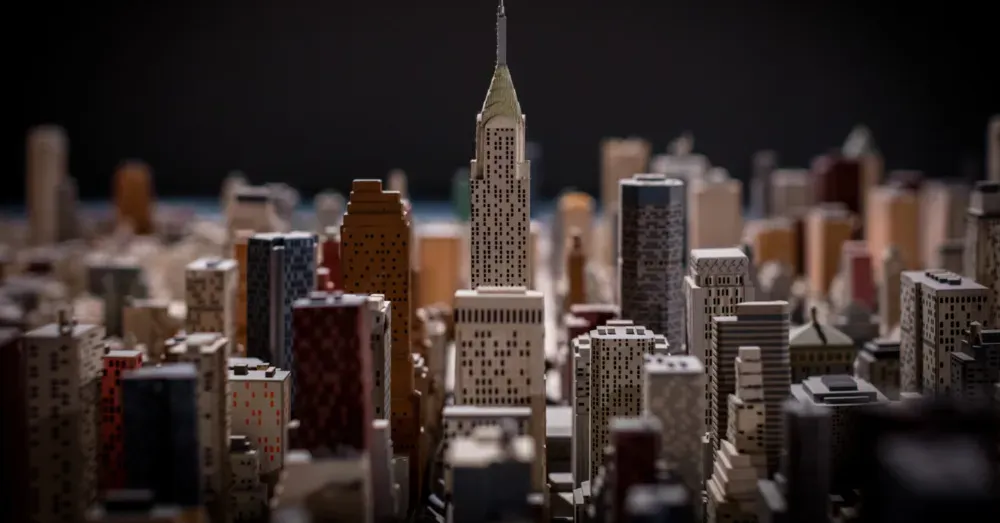
Wednesday, March 26th at 6pm ET: Join author Lynn Maliszewski, Assistant Director of Archives and Collections at the Queens Museum, for a free virtual talk and watch video of the original helicopter ride over the Panorama! 🚁
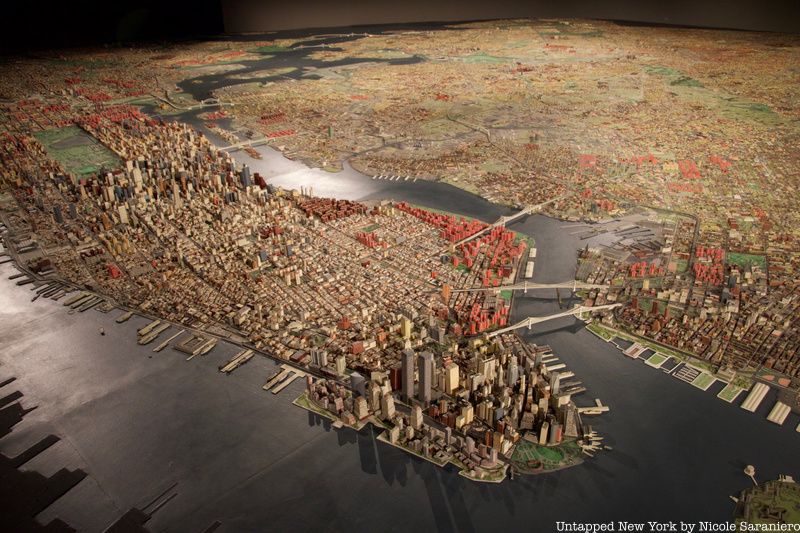
Like many attractions in Flushing Meadows Corona Park, such as the abandoned New York State Pavilion, the Column of Jerash, and the Hall of Science, the Panorama of the City of New York is a leftover of one of New York City’s World’s Fairs. Located within the Queens Museum (which was originally the New York City Pavilion at the 1939 fair), the Panorama was the brainchild of World’s Fair President Robert Moses. It was constructed for the 1964-1965 fair to celebrate the City’s municipal infrastructure and was originally viewed from above on an indoor helicopter ride.
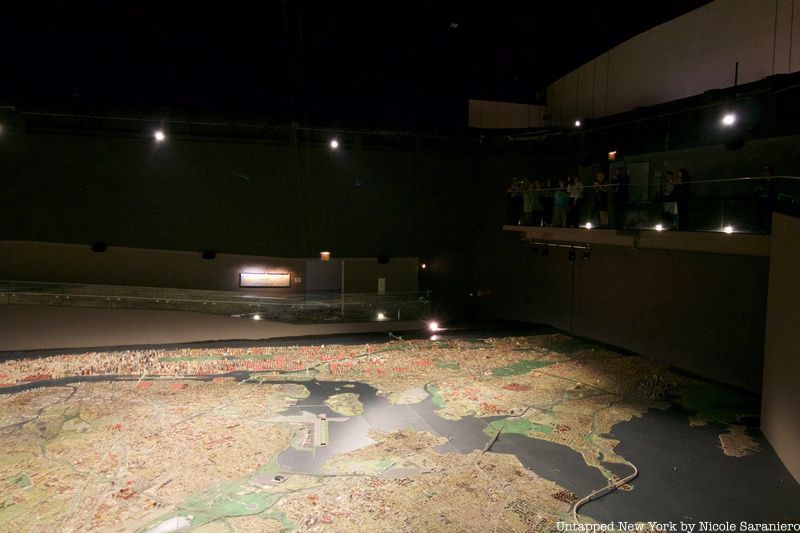
Stretching over 9,335 square feet, the Panorama of the City of New York is the largest architectural model in the world. It took three years to complete and required the work of over a hundred full-time workers. The total cost of the project in 1964 was $672,662.69. Comprised of 273 sections, the model originally contained 830,000 buildings. That number has grown to 895,000 buildings as of 2013. The architectural firm of Lester & Associates of West Nyack, New York brought the model to life with hand-crafted buildings and bridges made of wood, foam, paper, and brass at a scale where 1 inch is equivalent to 100 feet.

Didn't make it to the 1939/40 or 1964/65 fairs? Here's your chance!
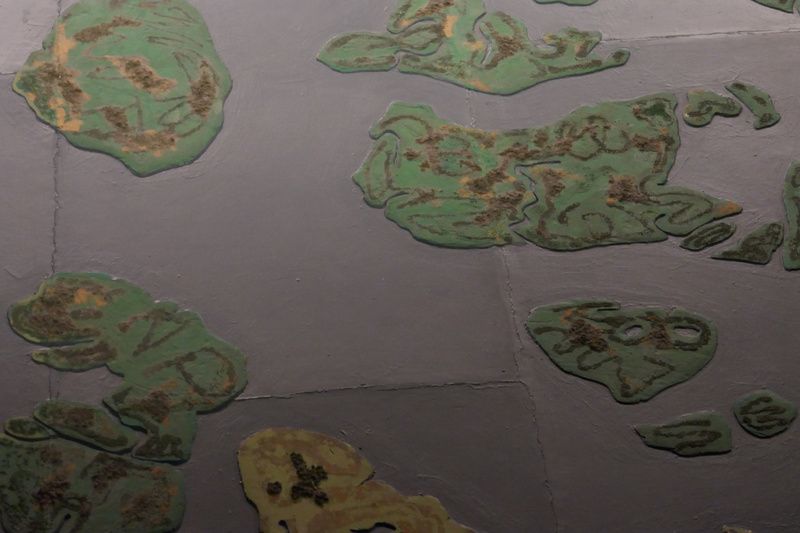
While working on the model with painstaking detail, some of the artists decided to leave a personal touch. In the bushes that adorn two islands in Jamaica Bay, you can make out the initials “N.P.” and the name “BILL” if you look very closely. They are pictured at the bottom left and middle right islands in the photo above.
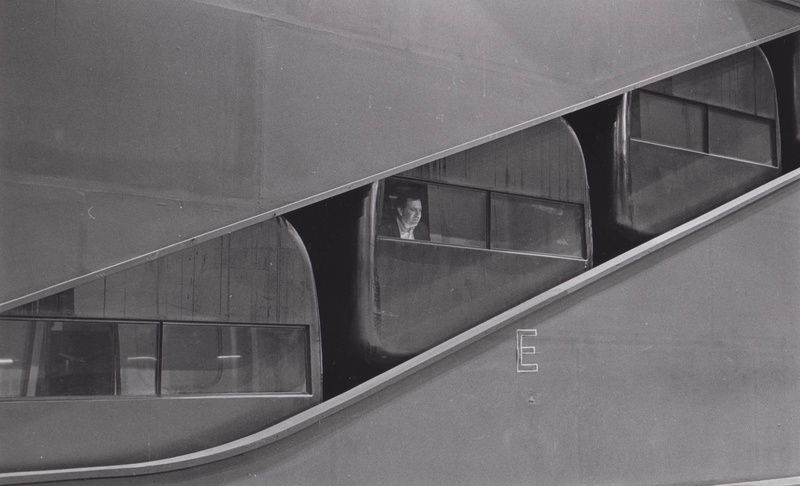
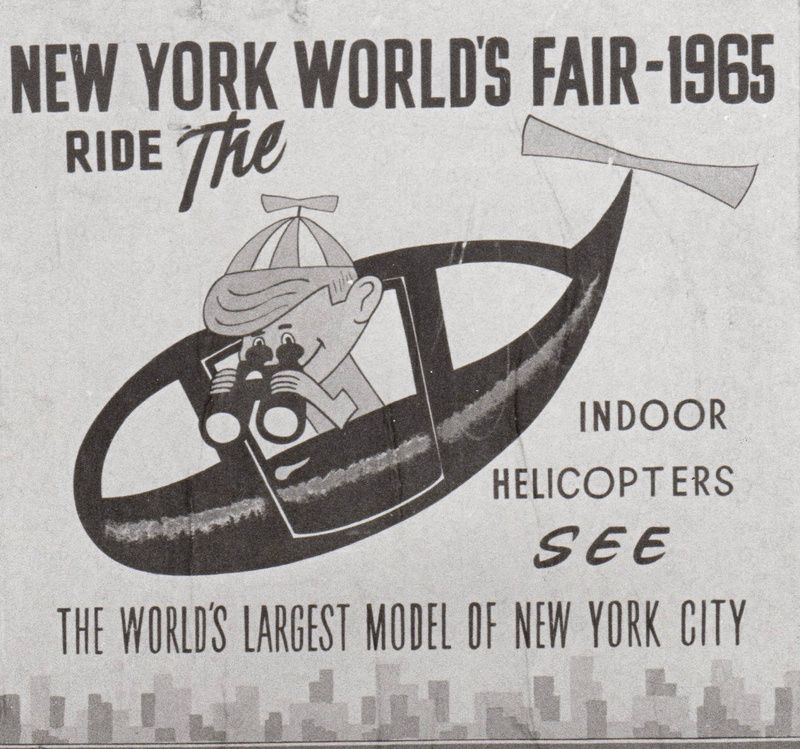
(Left) Phyllis Bilick, Helicopter cars in The Panorama of the City of New York, c. 1990. Vintage silver gelatin print. Provenance research in-progress (Right) New York City Exhibit at the 1964 New York World’s Fair, 1965. Poster. Provenance research in-progress, Images Courtesy of the Queens Museum
The first visitors to the Panorama during the World’s Fair got to experience it from an indoor helicopter ride. Within molded plastic cars on a track, visitors were treated to a view that simulated what they would see if they were flying above the five boroughs at 3,000 feet. During the 9-minute experience, riders listened to “The City of Opportunity,” a guided tour read by broadcast legend Lowell Thomas, which you can listen to on the Queens Museum website. The ride cost just 10 cents per person.
After “flying” around 3/4 of the perimeter of the model, the helicopters ascended to a second-story balcony. There, riders exited the vehicles and walked around the glass-enclosed platform, looking down at the model below. The view from this balcony mimics the way the city looks from 20,000 feet in the air. Today, one of the plastic helicopter cars still exists and is kept in storage at the Queens Museum. It was previously on display before the Museum’s 2013 renovation.
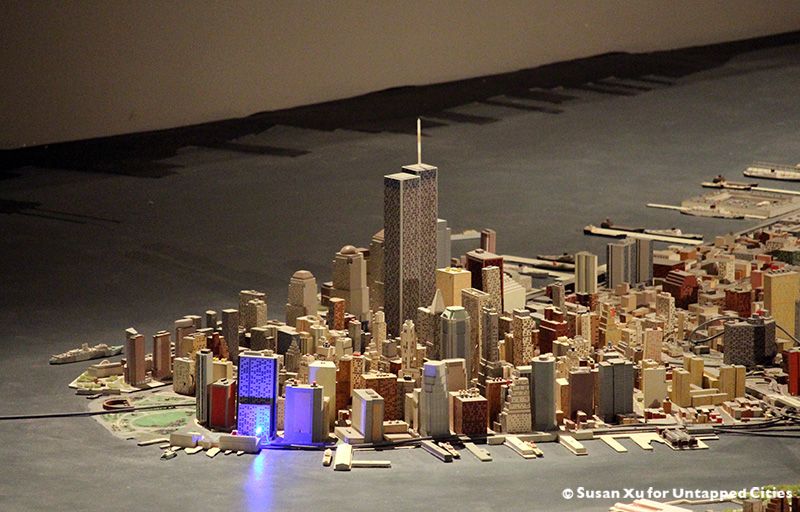
Scattered throughout the Panorama of the City of New York you will notice tiny multi-colored lights. There are a total of 3,172 in red, yellow, green, blue, and white. As the original intent of the model was to celebrate the municipal buildings of the city, each of those lights represents a different type of municipal building falling into the categories: recreation, commerce/welfare/transportation, health, education, and protection. A light glows at the location of New York City’s police precincts, firehouses, schools, hospitals, courthouses, libraries, and public housing projects, as well as water, gas, and electric stations, museums, schools, beaches, playgrounds, and other municipal sites.
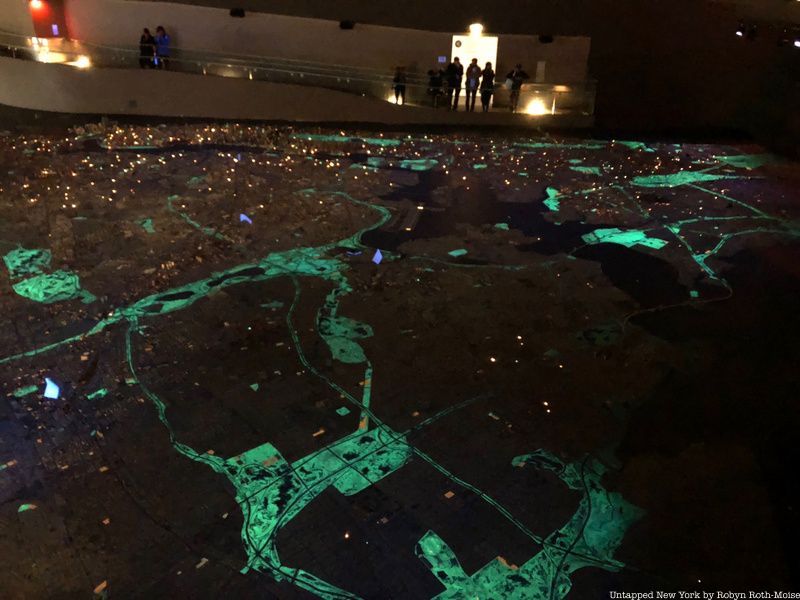
At the Panorama, the sun sets on New York City every 12 minutes. The lights slowly fade to recreate the illusion of dusk and then night falls. When in night mode, the model glows thanks to ultraviolet light and phosphorescent paints. The windows of skyscrapers glow and the parks of the city really pop out as they are painted a bright glowing green.
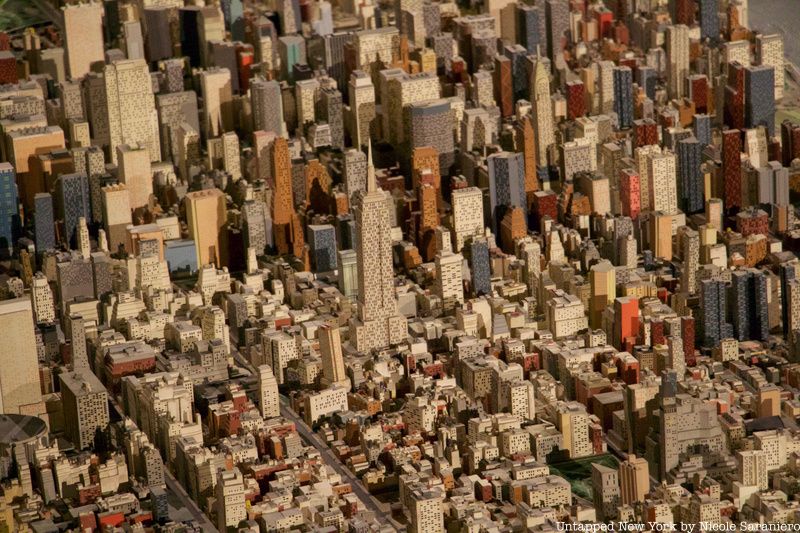
The Queens Museum has the most affordable option for buying New York City real estate. You can buy a part of the Panorama! As part of the museum’s Adopt-a-Building Program, you can help support the maintenance and preservation of the Panorama by purchasing a year-long lease for any property. You can adopt your first apartment, the building where you met your significant other, or any place that carries sentimental value while helping to extend the legacy of the panorama.
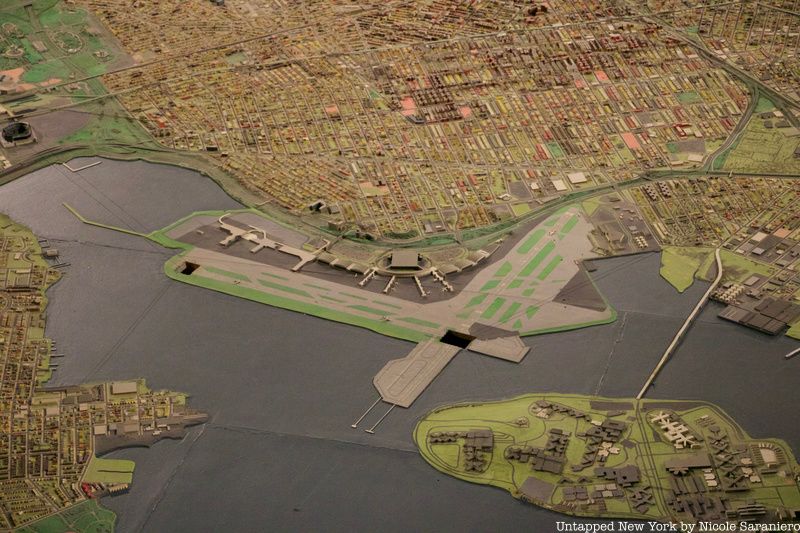
Another tiny detail of the Panorama of the City of New York is the airplane that lands and takes off from La Guardia Airport every few minutes. The tiny plane is attached to a wire that guides the plane into one end of the runway where it disappears underneath the model, then reappears at the other end to take to the sky once again. You can also see boats and barges on the city’s waterways, though those don’t move.
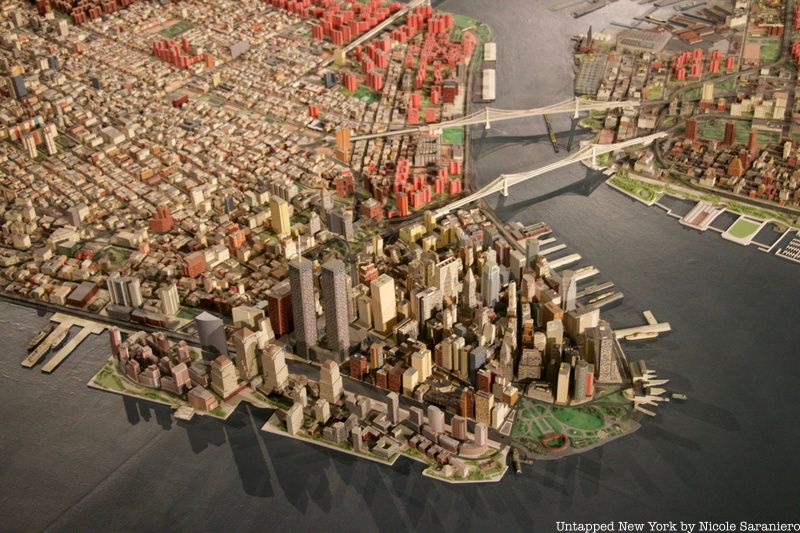
For a time after the fair, in 1967, 1968, 1969 and 1974, Lester & Associates updated the model regularly with new buildings. Throughout the 1980s, a few new buildings were donated including the AT&T (Sony) and Citicorp buildings. Many of the donations at this time were thanks to the firms that designed the structures, such as Emery Roth & Sons, which gave models of 17 of their New York City buildings. The enitre model was brought up to date in 1992. At that time, the museum closed for a two-year renovation. The helicopter ride was removed and a cantilever observation deck designed by Rafael Viñoly was installed above the Panorama. The entire panorama was removed from the museum and more than 60,000 buildings were updated, with 35,000 new additions. One of those additions was the Twin Towers.
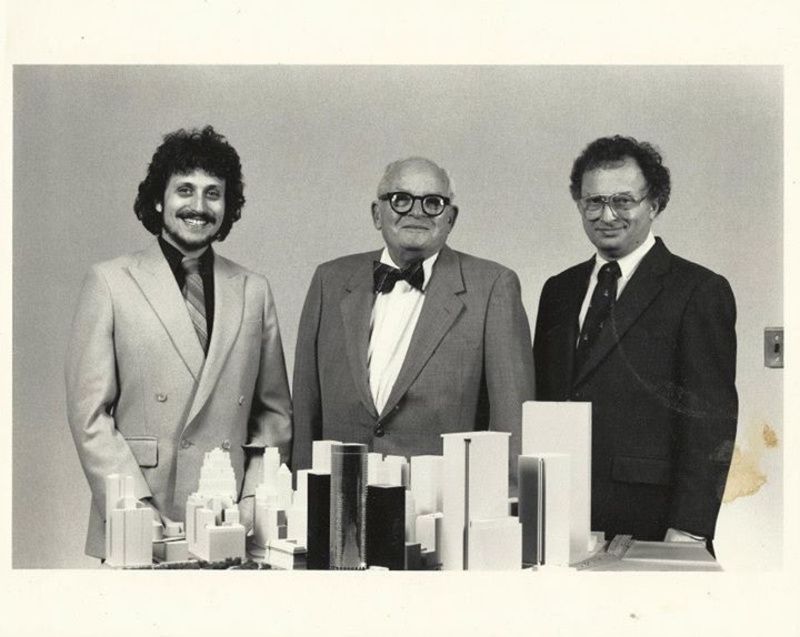
Since 1992, only a handful of new buildings and facilities have been added such as Yankee Stadium, Citi Field, Brooklyn Bridge Park, and the Newtown Creek Wastewater Treatment Plant. The Twin Towers however remain standing in Lower Manhattan, making The Panorama of the City of New York a representation of the city from different times in history. In 2013, to celebrate the creation of the municipal law which allowed for historic districts, tiny flags were added to the model in historic districts across the five boroughs.
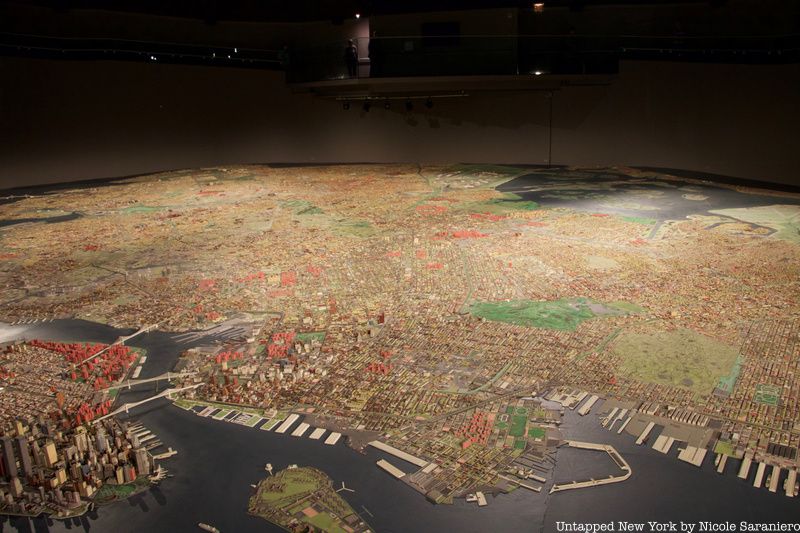
The Panorama of the City of New York has been seen on film in a few different projects in recent years. On television, the Panorama was seen in season 3 of Mr. Robot. On streaming, viewers got to watch Fren Lebowitz get the rare opportunity to walk on the rivers of the Panorama in Martin Scorsese’s Pretend It’s a City. On the silver screen, you can see the Panorama in the film Wonderstruck.
Next, check out 10 Secrets of the Queens Museum
This post contains affiliate links, which means Untapped New York earns a commission. There is no extra cost to you and the commissions earned help support our mission of independent journalism!
Originally published in 2023, updated March 2025.
Subscribe to our newsletter